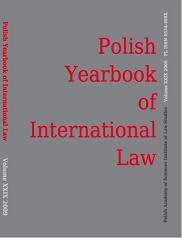Unilateral Acts in Polish-German Relations
Unilateral Acts in Polish-German Relations
Author(s): Przemysław SaganekSubject(s): Law, Constitution, Jurisprudence
Published by: Instytut Nauk Prawnych PAN
Keywords: unilateral act; international law; Germany; WW II; compensation
Summary/Abstract: The paper is devoted in fact to two unilateral acts. The first of them is the statement of chancellor Schröder made in Warsaw on 1 August, 2004. The second is the statement of the Polish government on the waiver of payments of German reparations made on 23 August, 1953. The first statement is generally believed to be an act of legal importance. The element that attaches the utmost importance is the promise of the German government to present before international courts the critical evaluation of individual claims of former owners of land on the territories that came under the Polish sovereignty after the Second World War. The elements of that evaluation embrace the conclusions according to which: “there could be no room for the restitution claims from Germany”, such claims would “put the history upside down”, “proprietary problems connected with the Second World War are no longer a subject for the two governments” and “neither the federal government nor any serious political force in Germany support such claims if they are nevertheless put”. There could be no room for doubt as to the legal force of that statement. Its descriptive style or inclusion of elements upon which the government has only limited or no influence at all (the behavior of political parties or individuals) cannot change the binding force of statements relating to the German state as such. In fact the statement is not only a promise. I contains also the elements of waiver and recognition (as to the fact that there is no longer a subject of claims and that they would put the history upside down). The waiver results from the same sentences. It is limited to claims made on the state level only. The individual ones are not cancelled as such. If they are however made and not satisfied there is no longer a possibility to put them on the level of states. The second act made in 1953 is also quite general. Although from the historical perspective there could be no doubt regarding the interrelationship between that act and the USSR-GDR agreement, the statement of the Polish government did not refer to the latter expressly. The author analyses critically the arguments aimed at the justification of the nullity of the act presented in the previous literature. In his opinion it would be very difficult (if possible at all) to put into question the legal force of the act. The author however is not prepared to accept the erection of the Chinese wall between the waiver and other international acts giving rise to the obligations of the author. In that context he refers to the rebus sic stantibus argument according to which the presentation of claims on the side of Germany could justify the new evaluation of the results of the war for the Polish state and nation. That solution would not be happy for any party nor for the stability of law, but it could be perceived as an extreme solution for the most extreme course of events.
Journal: Polish Yearbook of International Law
- Issue Year: 2009
- Issue No: 29
- Page Range: 85-113
- Page Count: 29
- Language: English
- Content File-PDF

